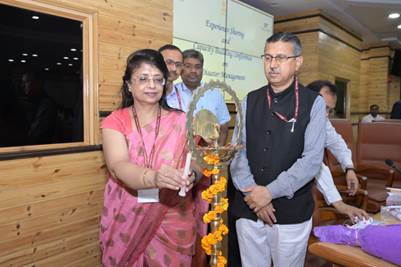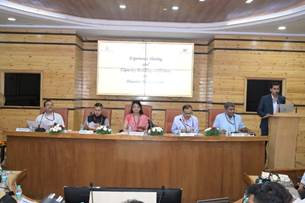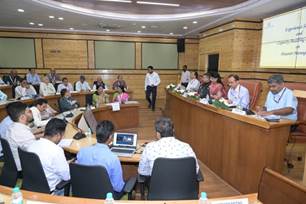
A high-level Capacity-Building Conference on Disaster Management underscored the indispensability of robust and resilient communication network in any kind of disaster management as it provides the backbone for all the authorities whether it is responders, state authorities and public. It highlighted that Telecommunication’s role is actually central in all phases of disaster management from preparedness, response, recovery and mitigation, to saving lives, maintaining order and ensuring that relief and rescue operations are carried out unhindered.



The Disaster Management Division of the Department of Telecommunications (DoT) in collaboration with in collaboration with the National Telecommunications Institute for Policy Research, Innovation, and Training (NTIPRIT) and LSA, Delhi successfully organized the conference today on “Experience Sharing and Capacity Building in Disaster Management”. All field units of DoT i.e., License Service Areas (LSA), Telecom Service Providers, NDMA and NIDM took part in the conference.
Jointly inaugurated by Member (Technology) Ms Madhu Arora, DoT, and Executive Director of the National Institute of Disaster Management (NIDM) Shri Rajendra Ratnoo, the conference held insightful discussions and expert sessions aimed at enhancing disaster preparedness and resilience in India. Director General Telecom, Shri Ravi G R and other senior officials of DoT and other organisations were also present on the occasion.
Occurrence of variety of natural disasters ranging from cyclones and floods to landslides and earthquakes, is heightened by ongoing climate changes. As these events become increasingly severe, the role of telecommunications in disaster management has never been more critical. Effective communication and coordination facilitated by telecom networks are essential for disaster response and recovery.
Delivering the keynote address, Member (T) said that DoT has been instrumental in developing an early warning system called the Combined Alert Protocol (CAP) which is for rapid dissemination of warnings which has helped in a big way in reducing the casualties during disasters. She informed that the CAP system sends nearly one billion messages monthly to warn the public about impending disasters to take necessary timely actions. Sharing real time data is vital for coordination of rescue and relief operations, medical response teams, emergency services, location of affected areas, and essential information to the public, she added.
Member (T) pointed out that DoT along with MHA and NDMA, is already working on a PPDR, a Public Protection and Disaster Relief Network, which will provide dedicated communication channels for emergency services. She also mentioned the rollout of Cell Broadcast Projects for targeted alerts and innovative solutions like tethered balloons and drones for temporary communication networks.
Emphasising the importance of building resilient telecom infrastructures and developing human capacity to handle disaster situations effectively, Mrs. Madhu Arora concluded by saying that DOT is fully committed to this critical mission of enhancing disaster resilience, and hoped that the lessons learned at the conference will be invaluable for improving our SoPs and protocols.
Key Highlights:
Interactive panel discussions and workshops with participation from key stakeholders facilitated exchange of knowledge and experiences on various aspects of disaster management, particularly focusing on the challenges faced in the aftermath of natural disasters. Session on ‘Preparedness Measures in Disaster Handling’ Chaired by the Executive Director of NIDM Sh Rajendra Ratnoo, focused on best practices and strategies to enhance preparedness at both the national and local levels. Director General of the Coalition for Disaster Resilient Infrastructure (CDRI) chaired the session on ‘Information and Communication Technology (ICT) in Disaster Management, highlighting the pivotal role of leveraging modern telecommunications infrastructure for real-time data sharing, communication with first responders, and maintaining connectivity during disasters.
A significant feature of the conference was a Table Top Exercise (TTEx) conducted in collaboration with NDMA, which was designed to simulate a disaster scenario and involved key stakeholders, including representatives from the LSAs, Ministry of Home Affairs (MHA), the National Disaster Response Force (NDRF), Telecom Service Providers (TSPs), and other relevant agencies. The exercise provided an opportunity to test and refine coordination, communication, and response strategies in a controlled environment, ensuring that participants are better prepared to handle real-life disaster situations.
The conference concluded with a set of actionable recommendations aimed at strengthening the integration of telecommunications in disaster management strategies. These include enhancing telecom infrastructure in vulnerable regions, increasing collaboration between government agencies and TSPs, and developing specialized training programmes for telecom personnel in disaster management.
The Department of Telecommunications reaffirm their commitment to working together with various stakeholders to build a resilient telecommunications network that can withstand the challenges posed by disasters. The insights and recommendations from this conference will play a crucial role in shaping future policies and initiatives aimed at safeguarding the nation’s communication infrastructure.
***
AD/DK

